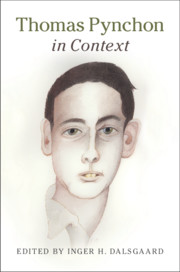Book contents
- Thomas Pynchon in Context
- Thomas Pynchon in Context
- Copyright page
- Contents
- Contributors
- Abbreviations
- Chronology
- Introduction
- Part I Times and Places
- Part II Culture, Politics, and Society
- Chapter 14 Family
- Chapter 15 Sex and Gender
- Chapter 16 Humor
- Chapter 17 Popular Culture
- Chapter 18 Music and Sound
- Chapter 19 Film and Television
- Chapter 20 Real Estate and the Internet
- Chapter 21 Politics and Counterculture
- Chapter 22 Drugs and Hippies
- Chapter 23 Ecology and the Environment
- Chapter 24 Capitalism and Class
- Chapter 25 War and Power
- Chapter 26 Conspiracy and Paranoia
- Chapter 27 Terror and Anarchy
- Chapter 28 Science and Technology
- Chapter 29 Mathematics
- Chapter 30 Time and Relativity
- Chapter 31 Philosophy
- Chapter 32 Religion and Spirituality
- Chapter 33 Death and Afterlife
- Part III Approaches and Readings
- Further Reading
- Index
Chapter 29 - Mathematics
from Part II - Culture, Politics, and Society
Published online by Cambridge University Press: 31 May 2019
- Thomas Pynchon in Context
- Thomas Pynchon in Context
- Copyright page
- Contents
- Contributors
- Abbreviations
- Chronology
- Introduction
- Part I Times and Places
- Part II Culture, Politics, and Society
- Chapter 14 Family
- Chapter 15 Sex and Gender
- Chapter 16 Humor
- Chapter 17 Popular Culture
- Chapter 18 Music and Sound
- Chapter 19 Film and Television
- Chapter 20 Real Estate and the Internet
- Chapter 21 Politics and Counterculture
- Chapter 22 Drugs and Hippies
- Chapter 23 Ecology and the Environment
- Chapter 24 Capitalism and Class
- Chapter 25 War and Power
- Chapter 26 Conspiracy and Paranoia
- Chapter 27 Terror and Anarchy
- Chapter 28 Science and Technology
- Chapter 29 Mathematics
- Chapter 30 Time and Relativity
- Chapter 31 Philosophy
- Chapter 32 Religion and Spirituality
- Chapter 33 Death and Afterlife
- Part III Approaches and Readings
- Further Reading
- Index
Summary
We might begin by asking: Why does “mathematics” merit its own entry here? Should it not be covered in the previous contribution, “Science and Technology”? Mathematics is an integral part of the sciences, and in many respects the role of math and science in literature can usefully be examined together. But mathematics is not a natural science such as physics, chemistry, or biology, which refer to nature and explain phenomena in the physical world by means of observation and empirical evidence. Rather, math is a structural science: It concerns relations between abstract entities, and we do not learn about it from observation, as it is a product of human thought. As such, math has a history of being compared with art: “mathematics, though classified as a science, is equally an art,” Brian Rotman writes in The Routledge Companion to Literature and Science; and sharing characteristics with both the natural sciences and the arts and humanities, math can be seen as a link between these “two cultures.” Attentive to the specificity of math and its relationship to other disciplines, Pynchon’s novels employ it not only as the epitome of reason but also to negotiate the possibilities and limits of art and, particularly, of literary fiction. Against the Day (2006) is the most obviously mathematical novel, but metaphors, concepts, and models from math appear in other works, as well, most significantly in Gravity’s Rainbow (1973) and Mason & Dixon (1997).
Information
- Type
- Chapter
- Information
- Thomas Pynchon in Context , pp. 233 - 238Publisher: Cambridge University PressPrint publication year: 2019
